When delving into the topic of slavery and attempting to understand its historical context, it is essential to approach it with sensitivity and a willingness to explore various perspectives. The Bible, as a religious text revered by millions worldwide, contains verses that discuss the topic of slavery.
However, it is crucial to interpret these verses within their cultural, historical, and theological contexts, acknowledging the evolution of moral principles throughout time. In this blog post, we will explore some Bible verses related to slavery while keeping in mind the broader message of love, justice, and compassion that Christianity promotes.
- Exodus 21:16
The verse states, “Whoever steals a man and sells him, and anyone found in possession of him, shall be put to death.” While this verse does not explicitly abolish slavery, it condemns the act of human trafficking and the exploitation of individuals as property. It implies that owning and trading slaves is morally unacceptable and punishable.
- Leviticus 25:39-46
These verses discuss the treatment of Israelite slaves and foreign slaves within the larger institution of slavery prevalent in ancient societies. It emphasizes the need to treat slaves with fairness and provide opportunities for them to redeem their freedom or be released after a specified number of years. Though this reflects a more regulated form of slavery, it demonstrates a compassionate approach towards those in bondage.
- Ephesians 6:5
This verse advises slaves to obey their earthly masters, but it is essential to consider the historical context. Slavery was a deeply entrenched social institution in the Roman Empire, and the focus was on encouraging harmonious relationships in an unequal system. However, this verse should not be interpreted as an endorsement of slavery itself, as the broader teachings of love, equality, and mutual respect throughout the Bible contradict such oppression.
- Philemon 1:15-16:
In this letter from Paul to Philemon, he encounters a situation involving a runaway slave named Onesimus. Instead of promoting rebellion or condemnation, Paul paradoxically encourages Philemon to receive Onesimus “no longer as a slave but more than a slave, as a beloved brother.” This highlights the transformative power of love, urging believers to recognize the inherent dignity of all individuals, regardless of their social status.
More bible verses about slavery
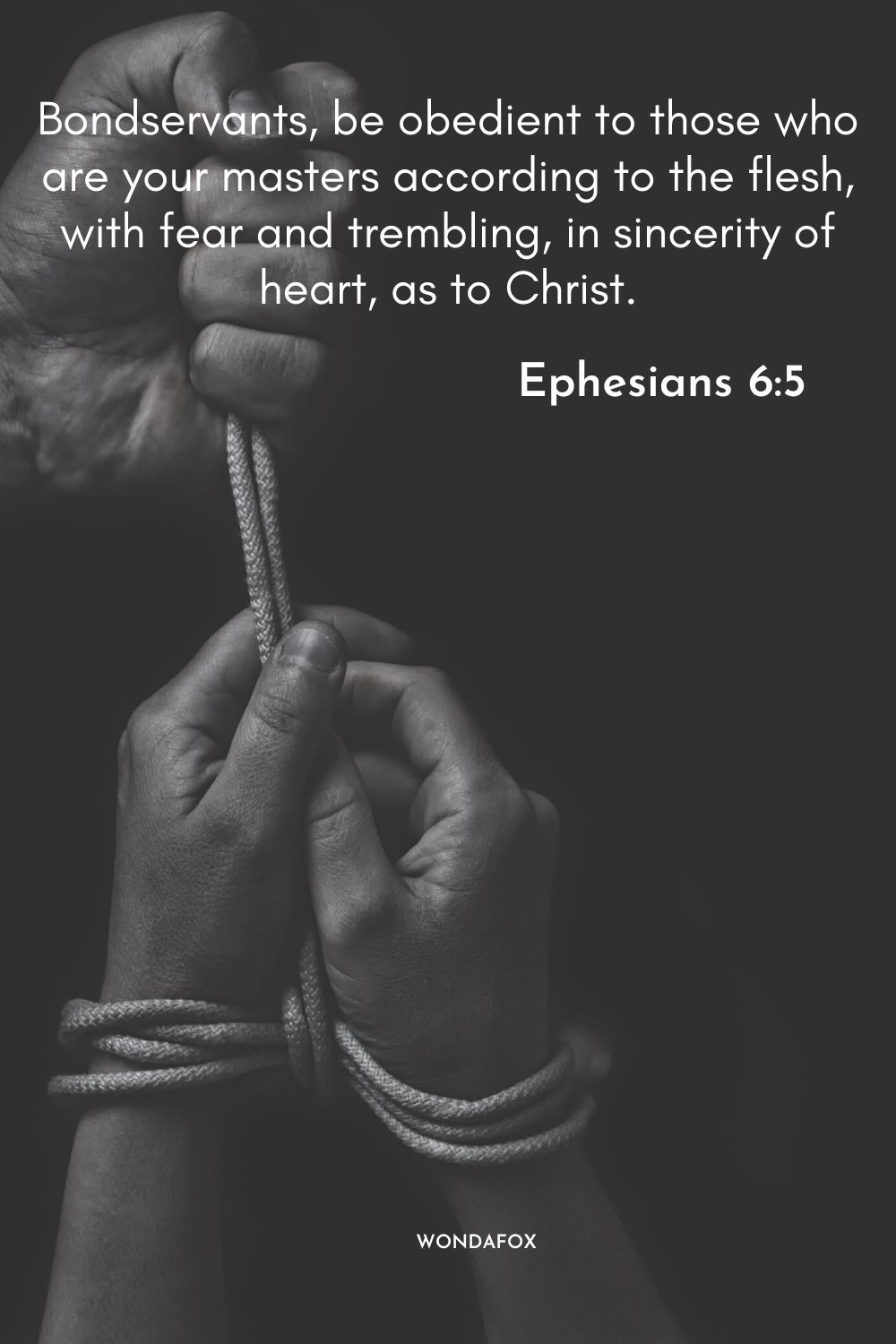
Ephesians 6:5
Bondservants, be obedient to those who are your masters according to the flesh, with fear and trembling, in sincerity of heart, as to Christ.
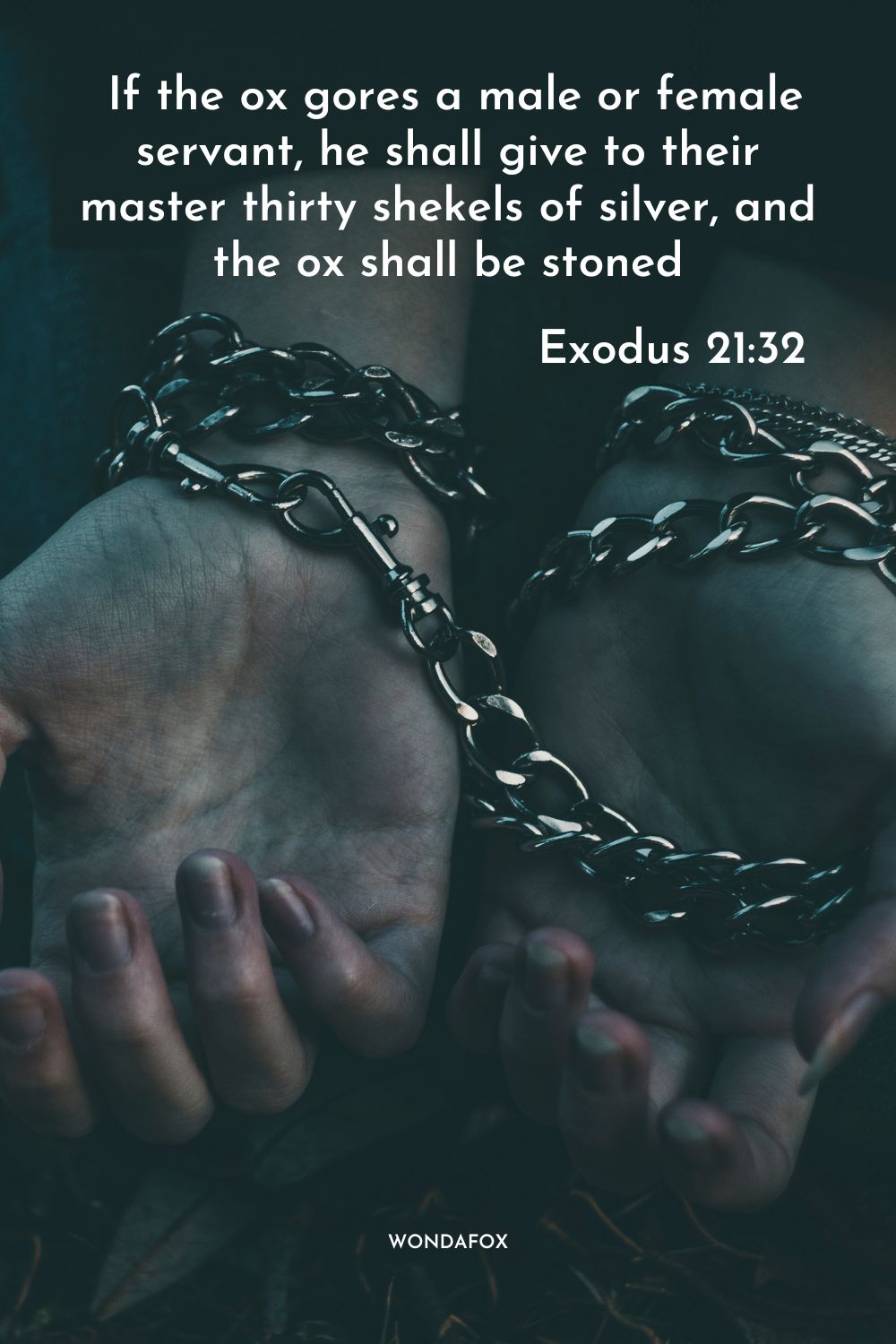
Exodus 21:32
If the ox gores a male or female servant, he shall give to their master thirty shekels of silver, and the ox shall be stoned.

Job 31:13-14
“If I have rejected the cause of my manservant or my maidservant when they brought a complaint against me, what then shall I do when God rises up? When he makes an inquiry, what shall I answer him?

Titus 2:9
Exhort bondservants to be obedient to their own masters, to be well-pleasing in all things, not answering back
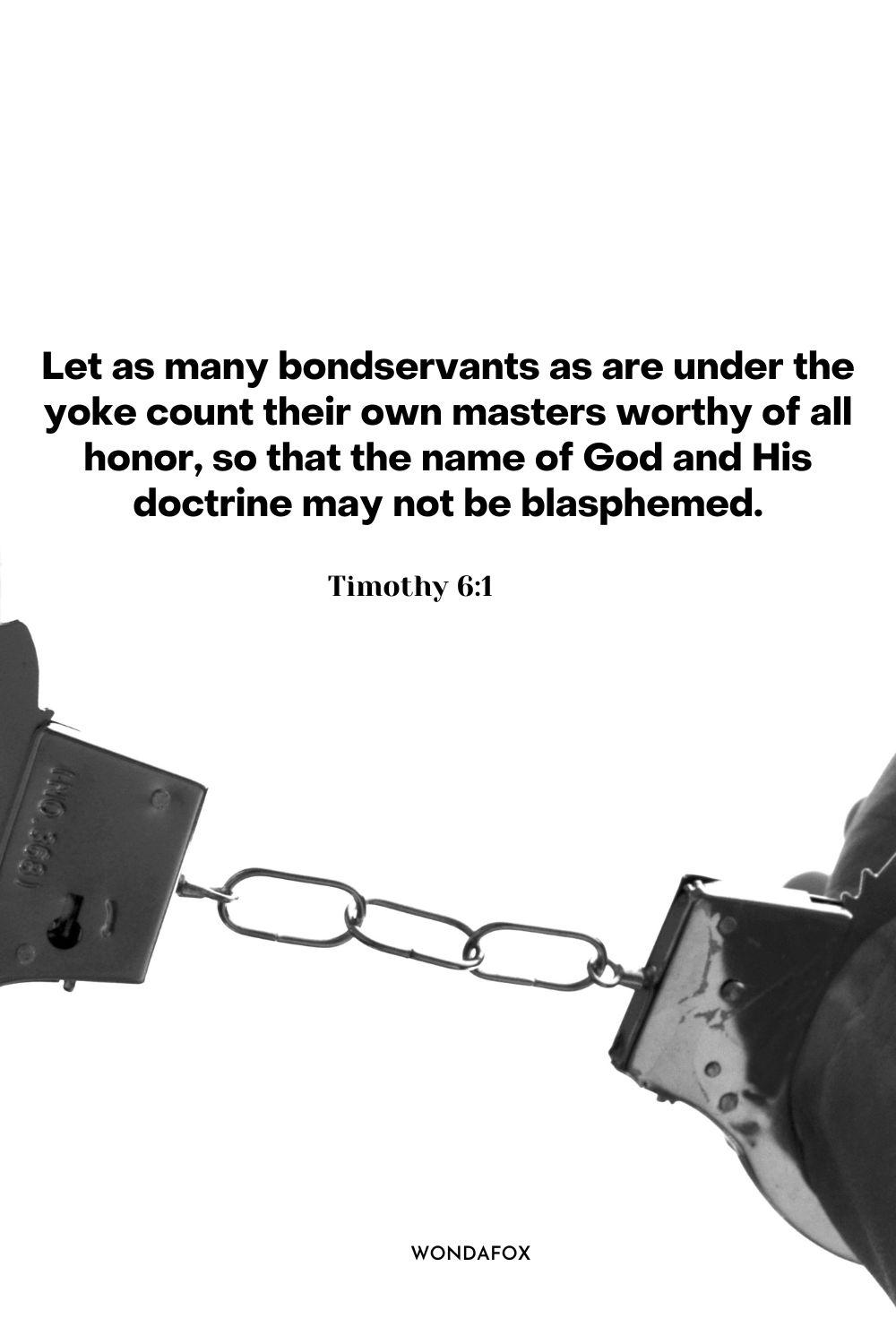
Timothy 6:1
Let as many bondservants as are under the yoke count their own masters worthy of all honor, so that the name of God and His doctrine may not be blasphemed.

Matthew 10:24
A disciple is not above his teacher, nor a servant above his master.
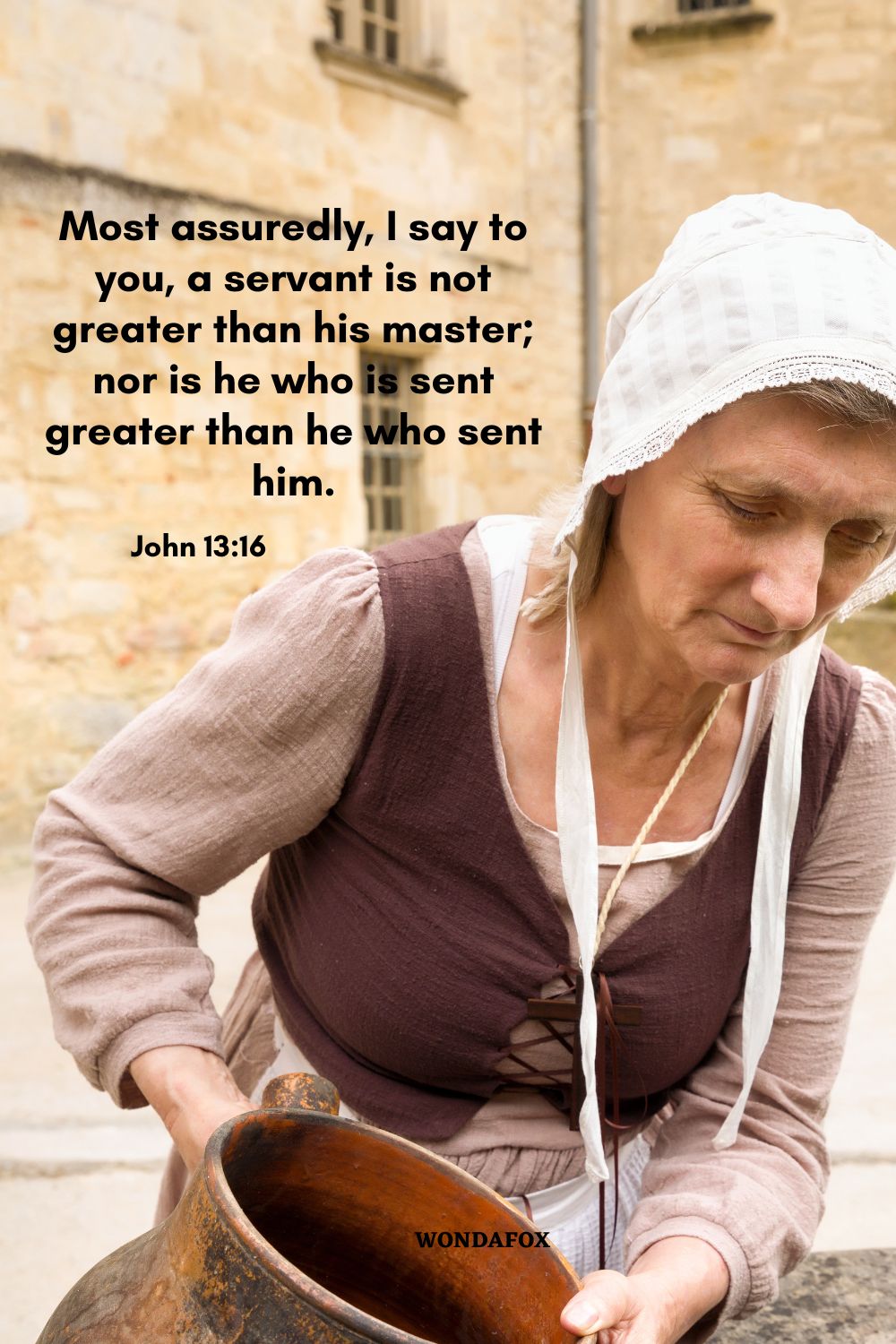
John 13:16
Most assuredly, I say to you, a servant is not greater than his master; nor is he who is sent greater than he who sent him.

John 15:20
Remember the word that I said to you, ‘A servant is not greater than his master.’ If they persecuted Me, they will also persecute you. If they kept My word, they will keep yours also.

Matthew 10:25
It is enough for a disciple that he be like his teacher, and a servant like his master. If they have called the master of the house Beelzebub, how much more will they call those of his household!

Luke 17:7-8
And which of you, having a servant plowing or tending sheep, will say to him when he has come in from the field, ‘Come at once and sit down to eat’? But will he not rather say to him, ‘Prepare something for my supper, and gird yourself and serve me till I have eaten and drunk, and afterward you will eat and drink’?

Matthew 20:27
And whoever desires to be first among you, let him be your slave

Mark 10:44
And whoever of you desires to be first shall be slave of all.

Galatians 4:1
Now I say that the heir, as long as he is a child, does not differ at all from a slave, though he is master of all

Colossians 3:22
Bondservants, obey in all things your masters according to the flesh, not with eyeservice, as men-pleasers, but in sincerity of heart, fearing God.

Proverbs 30:10
Do not malign a servant to his master,
Lest he curse you, and you be found guilty.
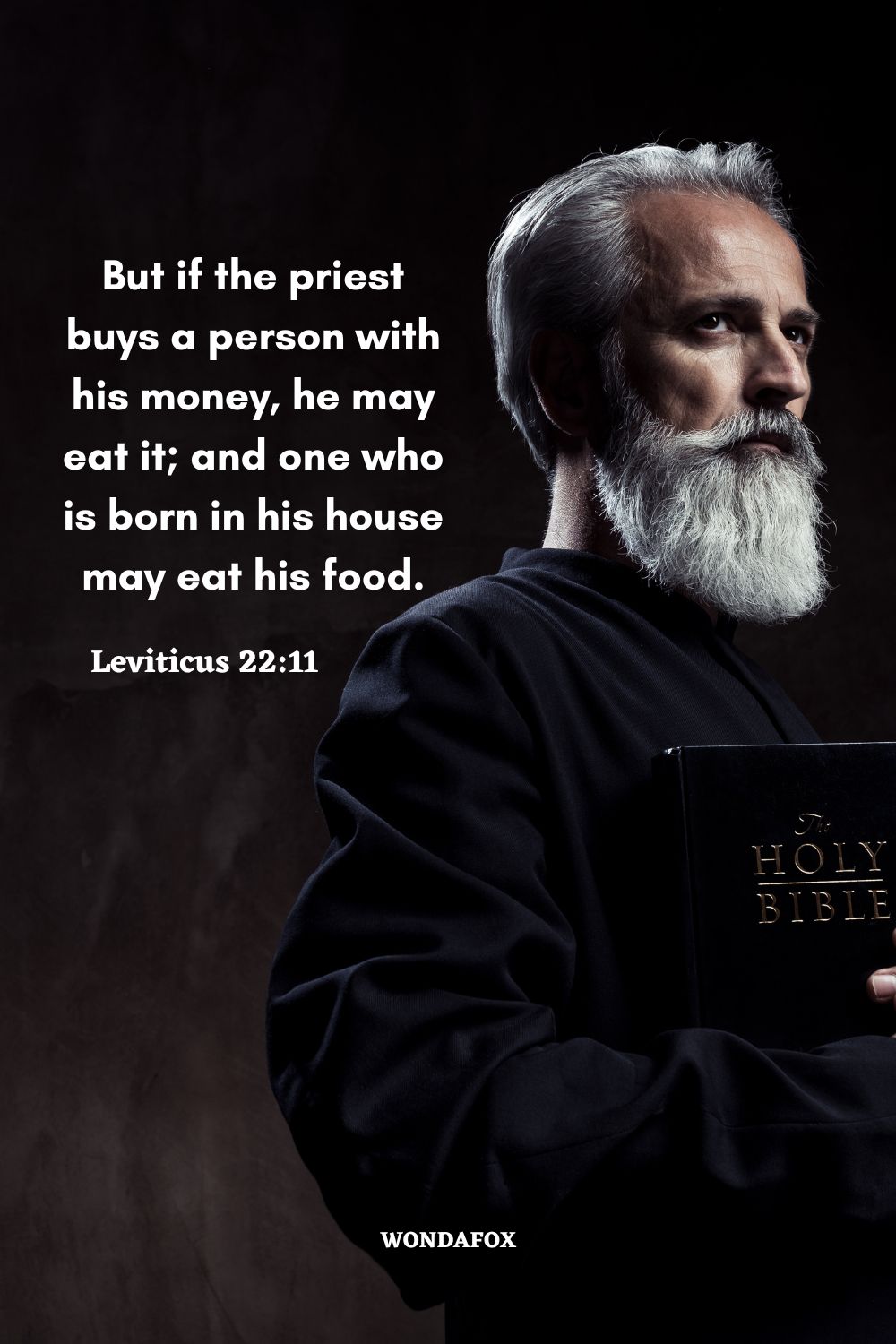
Leviticus 22:11
But if the priest buys a person with his money, he may eat it; and one who is born in his house may eat his food.

Lamentations 5:8
Servants rule over us, there is none to deliver us from their hand.

Job 7:2-4
Like a servant who earnestly desires the shade,
and like a hired man who eagerly looks for his wages So I have been allotted months of futility, And wearisome nights have been appointed to me. When I lie down, I say, ‘When shall I arise, And the night be ended?’ For I have had my fill of tossing till dawn.

Proverbs 30:22
For a servant when he reigns,
A fool when he is filled with food,

Ecclesiastes 10:7
I have seen servants on horses,
While princes walk on the ground like servants.
Related Posts

Galatians 4:8
But then, indeed, when you did not know God, you served those which by nature are not gods.
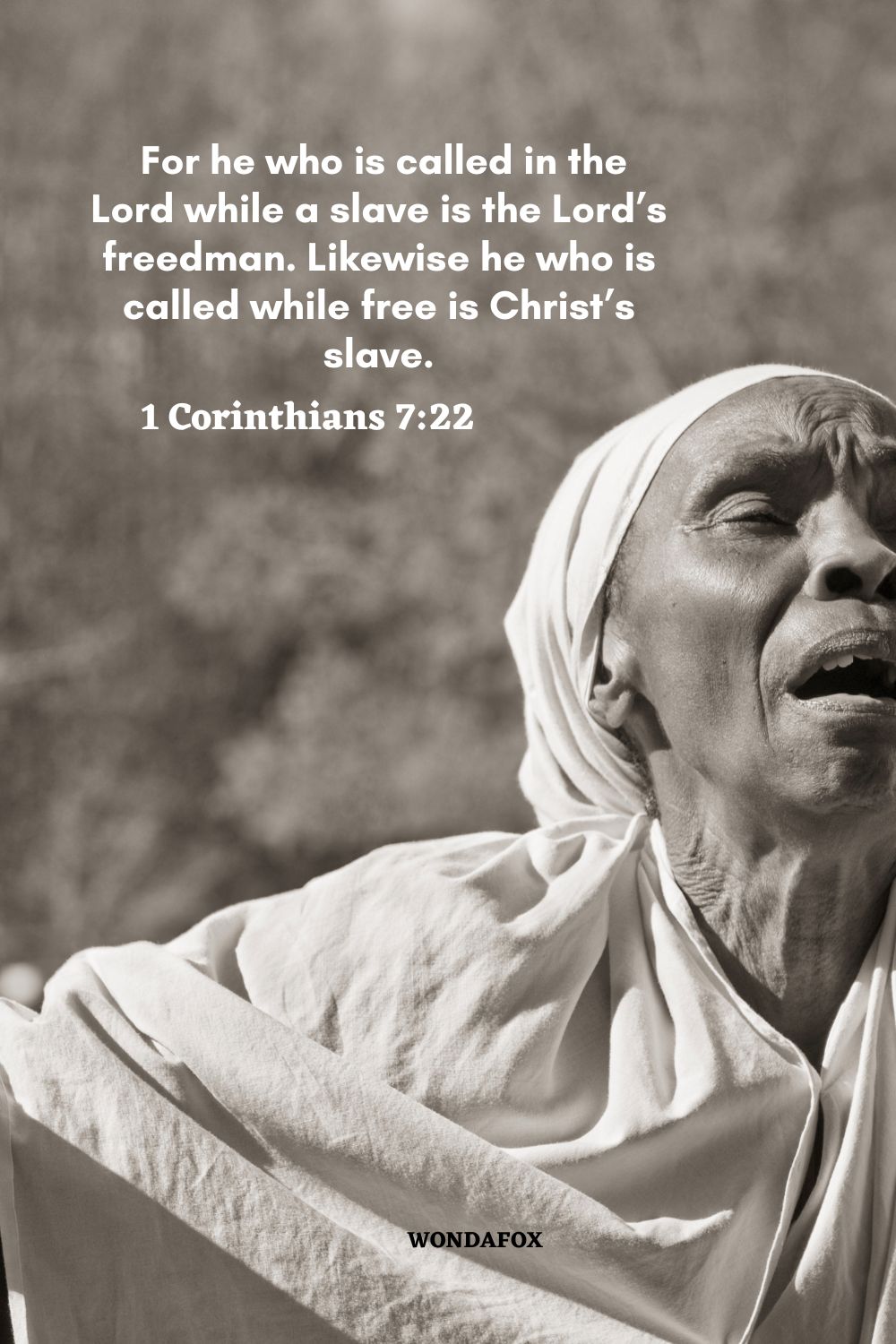
1 Corinthians 7:22
For he who is called in the Lord while a slave is the Lord’s freedman. Likewise he who is called while free is Christ’s slave.
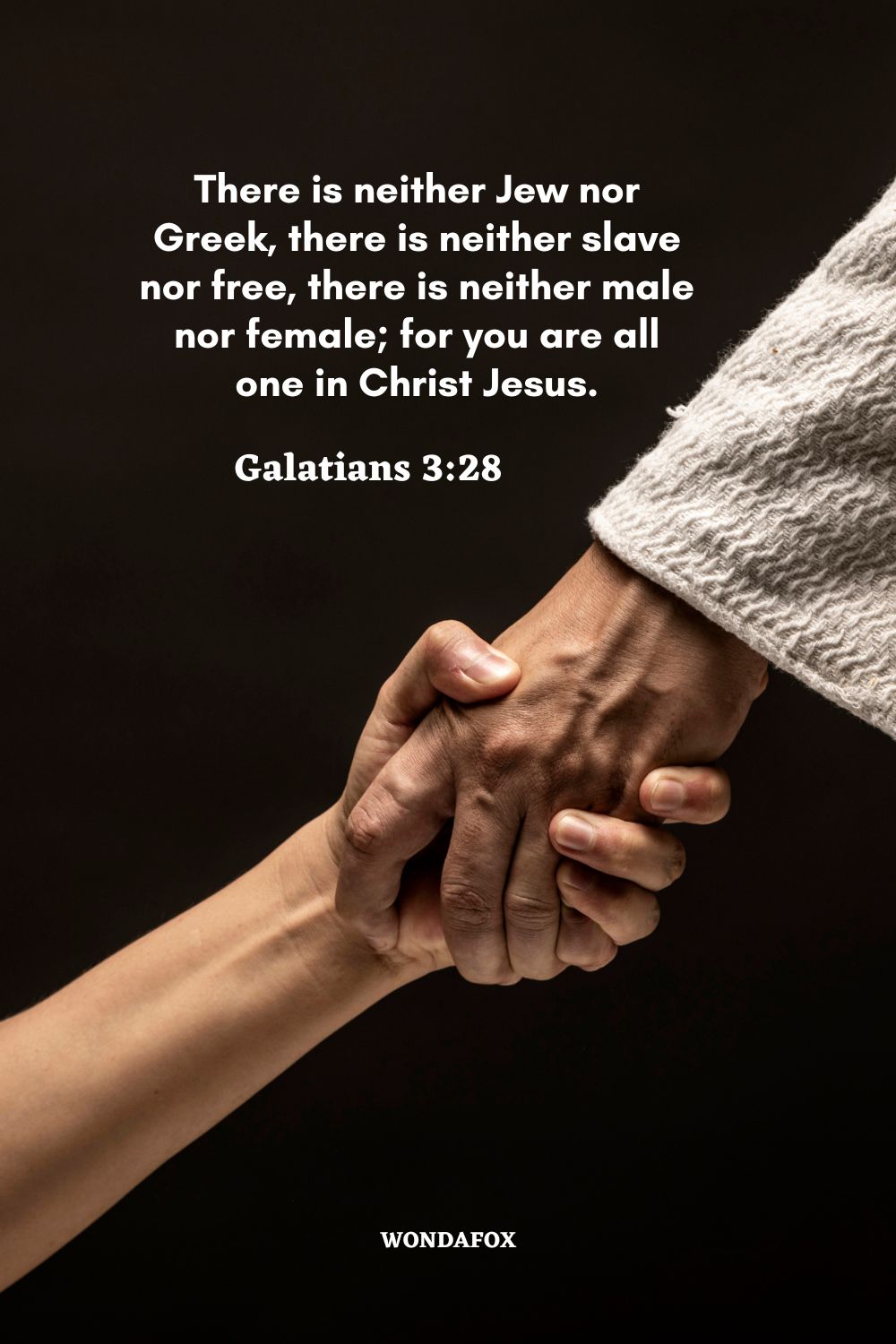
Galatians 3:28
There is neither Jew nor Greek, there is neither slave nor free, there is neither male nor female; for you are all one in Christ Jesus.

Colossians 3:11
Where there is neither Greek nor Jew, circumcised nor uncircumcised, barbarian, Scythian, slave nor free, but Christ is all and in all.

John 15:15
No longer do I call you servants, for a servant does not know what his master is doing; but I have called you friends, for all things that I heard from My Father I have made known to you.
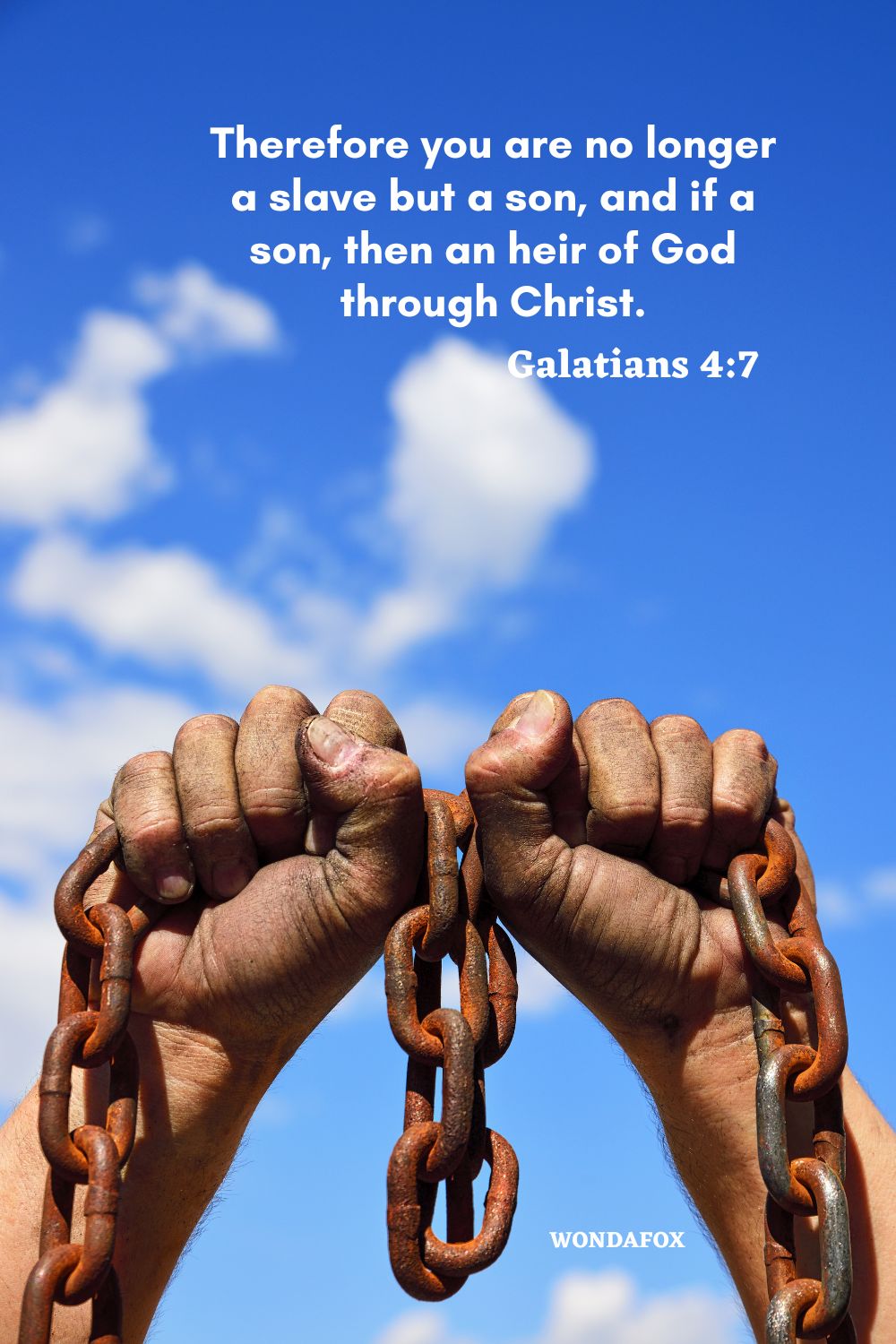
Galatians 4:7
Therefore you are no longer a slave but a son, and if a son, then an heir of God through Christ.
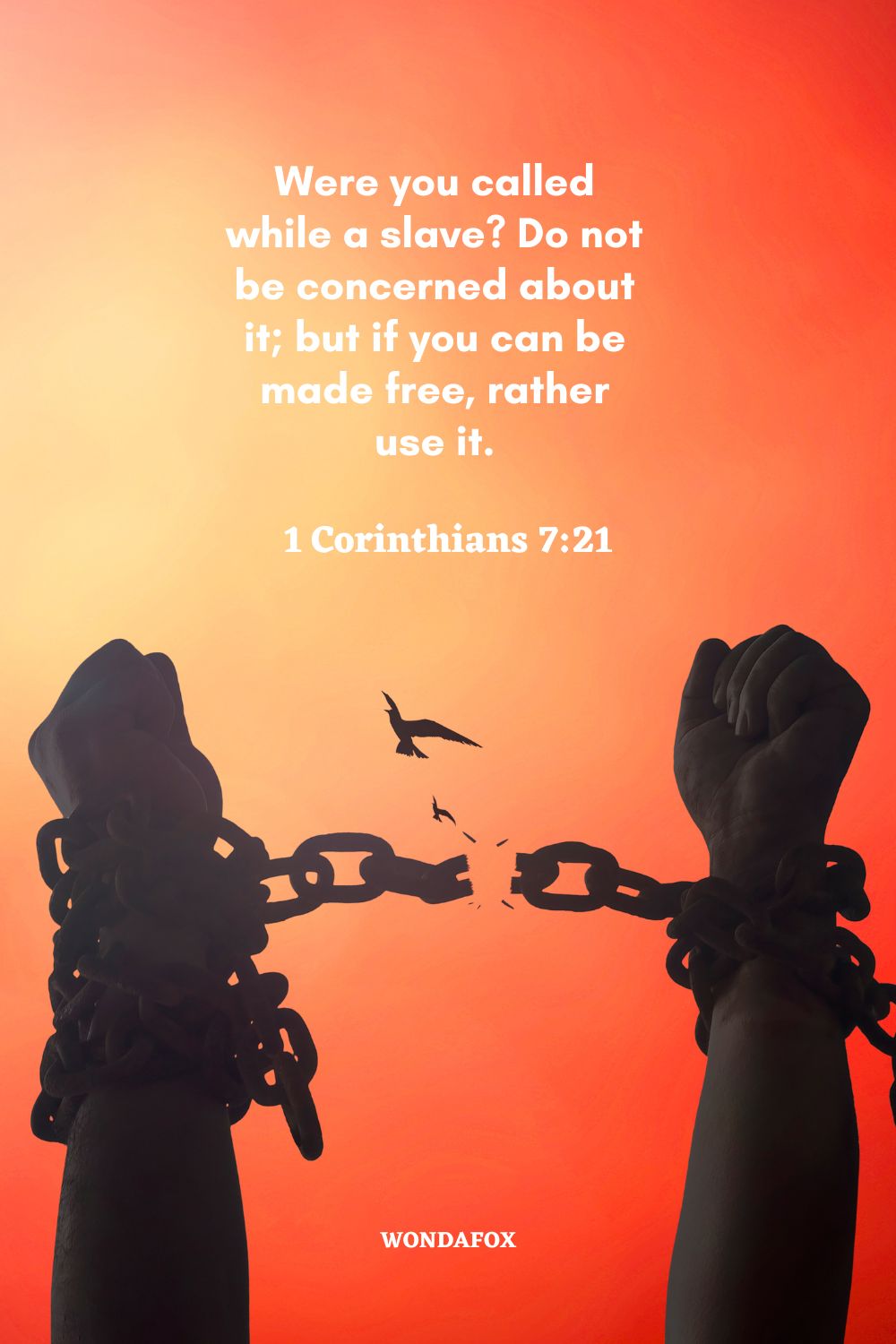
1 Corinthians 7:21
Were you called while a slave? Do not be concerned about it; but if you can be made free, rather use it.

Genesis 37:36
Ow, the Midianites had sold him in Egypt to Potiphar, an officer of Pharaoh and captain of the guard.

Deuteronomy 24:7
“If a man is found kidnapping any of his brethren of the children of Israel, and mistreats him or sells him, then that kidnapper shall die; and you shall put away the evil from among you.

Genesis 12:16
He treated Abram well for her sake. He had sheep, oxen, male donkeys, male and female servants, female donkeys, and camels.
While the Bible does contain verses that address the topic of slavery, it is vital to interpret them within their particular historical and cultural contexts. As we study these verses, it is crucial to remember the overarching teachings of Christianity, promoting love, justice, and compassion for all.
The Bible progressively challenges and transforms societal structures over time, leading Christians to advocate for liberation, empathy, and equality in light of Christ’s teachings. Slavery, both in biblical times and in history, stands in opposition to these principles, and it is our responsibility to embody the spirit of love and equality as we interpret and apply scripture to contemporary issues.





